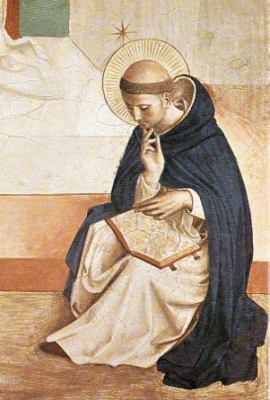Last month I talked about meeting my elder brother Thomas, St. Thomas Aquinas. Thomas came and got me and led me back into the Catholic Church; and eventually he led me into the Dominican order as what they used to call a "Third Order Dominican". And that means that I not only got to know Thomas; I got to know St. Dominic as well.
Dominic de Guzman was an Augustinian canon at the cathedral of Osma in Spain; canons are like monks in that they live cloistered in community, but they are associated with cathedrals in cities rather than with monasteries in the country. Bishop Diego of Osma was sent on a diplomatic mission to Denmark, and he took young Dominic with him; and on the way through the south of France they encountered the Albigensians, also known as the Cathars. The Albigensians were gnostic heretics of the austere rather than carnal variety, and were attracting many followers in those parts because of their austerity and asceticism. The people in the area were mostly poor, and as these were the days when Bishops were princes of the Church and wore rich clothing and travelled with large baggage trains, the poor folks thought that the Albigensians made a nice change. More than that, the Albigensians built schools for the daughters of well-to-do families, and many families took advantage of that. It was a shrewd move, and of course many of the well-taught young ladies adopted the Albigensian beliefs.
Churchmen had been sent to preach against the Albigensians, to little avail: they came in their finery, and lost the battle before they'd even begun.
Bishop Diego was no fool; and at an appropriate time he and Dominic put on simple robes, and left their horses and finery behind, and went to preach to the Albigensians from a position of evangelical poverty…and were notably successful. They met the heretics at their own game, and held debates with them, and usually won. The first monastery of Dominican nuns was founded by St. Dominic, in Prouille, France, to house women who had returned to orthodoxy and asked his help to live a holy and monastic life. There are Dominican nuns living in Prouille to this day.
Evangelical poverty was in the air in those days; St. Francis was a contemporary of St. Dominic and founded the Order of Friars Minor shortly before St. Dominic officially founded the Order of Preachers. Like the Franciscans, the first Dominicans were mendicant friars, getting their bread by begging from door to door. But here is the difference between the Franciscans and the Dominicans: for the Franciscan, poverty is the road to Christ, who was poor, but for the Dominican poverty is a means to an end, which is preaching for the salvation of souls.
When Dominic founded the order and wrote up its first rule (based for a number of reasons on the rule of St. Augustine), he knew that times change and that successful preaching will look different in every age and every place. He didn't want to bind his followers to a way of life that might eventually hinder preaching, so he made it clear that he expected the rule to evolve as necessary. More than that, he wanted his followers to be bound by love and not by fear. It was and is the usual thing for the rule of a religious order to bind on pain of sin: transgressions of the rule must be repented of and confessed. The Dominican rule states explicitly that it does not bind on pain of sin; and that portions of it might be relaxed at need. One studying to be a preacher, for example, might be excused from praying some of the canonical hours so as to devote that time to study. And Dominic was serious about this: when he learned that some of his friars were bringing failures to obey his new rule to the confessional, he threatened to tear it up.
Dominic was known for his gentleness, for his focus on Christ, and for his prayer. He was said to speak only of God or to God, and indeed he habitually spent his nights praying in the sanctuary of whatever church or friary he found himself in at the close of day. Even when he had his own cot he seldom used it, but slept before the altar when he could remain awake no longer.
I love St. Dominic for his gentleness, for his trust of his friars, and for his legacy. To save a man's soul you must persuade him of the truth, which is to say Christ, and so you must know the truth thoroughly and well; but also you must listen thoroughly and well, because you must meet people where and as they are and tailor your preaching to your audience. (There's a reason why the Dominican order is so well represented on the Internet.)
Dominic's favorite scriptures were the Gospel of Matthew and the Epistles of Paul, and he took both with him wherever he went. And like Paul, he taught his followers to be all things to all men…or, perhaps, to be the right things to these men, these men right in front of them. And eight hundred years later we still follow St. Dominic, and still preach for the salvation of souls.
Copyright 2013 Will Duquette
About the Author

Guest
We welcome guest contributors who graciously volunteer their writing for our readers. Please support our guest writers by visiting their sites, purchasing their work, and leaving comments to thank them for sharing their gifts here on CatholicMom.com. To inquire about serving as a guest contributor, contact editor@CatholicMom.com.



.png?width=1806&height=731&name=CatholicMom_hcfm_logo1_pos_871c_2728c%20(002).png)
Comments